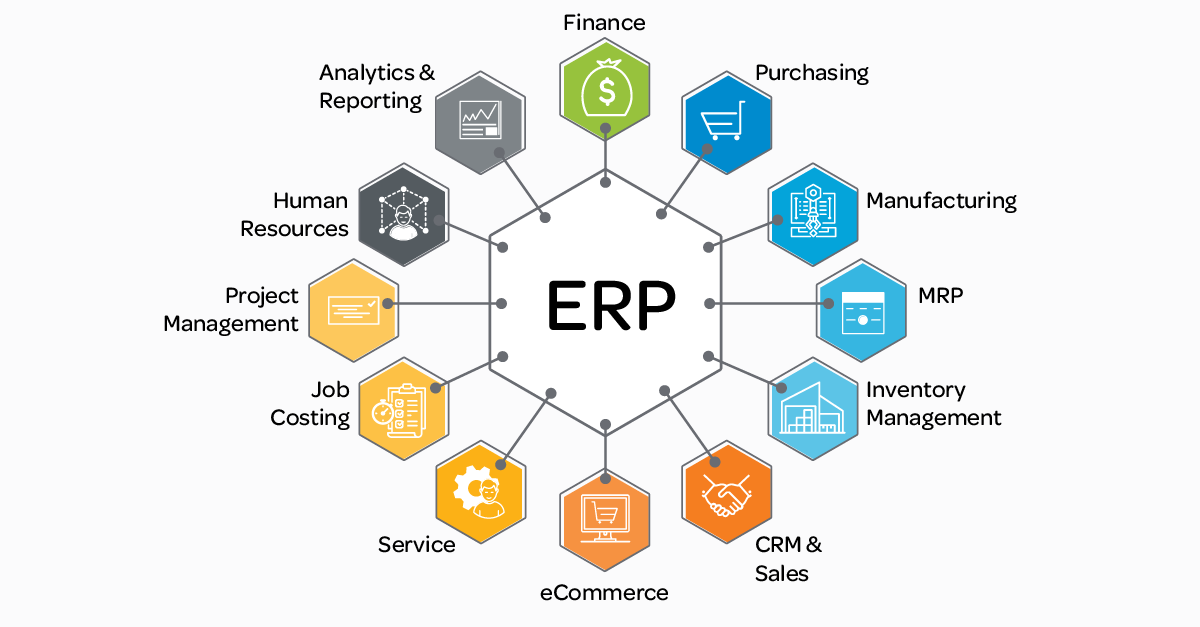In the ever-evolving landscape of modern business, efficiency, integration, and streamlined processes are crucial for sustainable growth. One indispensable tool that empowers businesses to achieve these goals is Enterprise Resource Planning (ERP) systems. Let’s delve into this comprehensive guide to understand the essence, functionalities, and benefits of ERP systems.
What is an ERP System?
At its core, an ERP system is a robust software suite designed to integrate and manage core business processes in real-time. It acts as a centralized hub, connecting various departments within an organization, including finance, HR, manufacturing, supply chain, inventory, and more. By consolidating data and processes into a unified platform, ERP systems facilitate seamless communication, data flow, and decision-making across an entire organization.
Key Components and Functionality
Centralized Database: ERP systems house a centralized database that serves as a repository for all organizational data. This allows for accurate, up-to-date information accessible across departments, eliminating data silos and redundancy.
Modules for Various Functions: Typically, ERP systems comprise modules tailored to specific business functions such as accounting, human resources, customer relationship management (CRM), inventory management, procurement, and more. Each module serves a distinct purpose but operates harmoniously within the integrated system.
Automation and Workflow Management: ERP systems automate repetitive tasks and streamline workflows. They enable standardized processes, reducing manual intervention and human error while enhancing operational efficiency.
Reporting and Analytics: With robust reporting and analytics tools, ERP systems provide valuable insights through data visualization, allowing businesses to make informed decisions based on real-time data.
Advantages of Implementing an ERP System
Enhanced Efficiency and Productivity: By automating processes and providing a unified platform, ERP systems optimize operational efficiency, saving time and resources.
Improved Decision-Making: Access to real-time data and comprehensive analytics empowers businesses to make informed decisions quickly and effectively.
Better Customer Service: A consolidated view of customer information through CRM modules enables personalized interactions and improved customer service.
Cost Savings: Elimination of redundant processes, better inventory management, and streamlined operations contribute to cost savings over time.
Challenges and Considerations
Implementing an ERP system is a substantial undertaking that may pose challenges such as:
- Integration Complexity: Migrating from disparate systems to an integrated ERP solution requires careful planning and seamless integration.
- User Adoption: Training and ensuring user adoption across the organization is crucial for successful implementation.
- Customization Needs: Tailoring the ERP system to align with specific business requirements might necessitate customization, which could impact timelines and costs.
Conclusion
In today’s dynamic business environment, ERP systems are indispensable tools that drive efficiency, integration, and agility across organizations. Their ability to centralize data, automate processes, and provide actionable insights positions businesses for sustained growth and competitiveness.
At CodeProMax Tech, we understand the significance of ERP systems in transforming businesses. Our expertise lies in crafting tailored ERP solutions to meet unique business needs, enabling our clients to thrive in an ever-evolving market landscape.
Whether you’re considering implementing an ERP system or looking to enhance your existing setup, partnering with us ensures a seamless journey towards operational excellence.
For further insights and tailored ERP solutions, feel free to connect with us. Your journey to optimized business processes begins here, at CodeProMax Tech.
